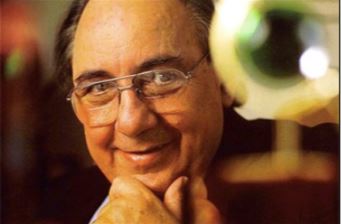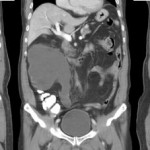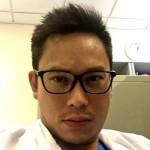A Lifetime of Giving – Donald S Coffey (1932-2017)
For those who knew Donald Coffey (the “Chief’”), the inquisitive smile says it all. Don spent his professional life sharing his knowledge, wisdom, humor, and encouragement to everyone that he encountered and mentored –and the list is very, very long. It would be difficult to measure the impact Don had on the field of urology and cancer research, given the countless clinicians and scientists that he mentored and inspired to pursue academic careers.
Born in Bristol, VA in 1932, his life story is not in the least traditional including chemist, engineer, laboratory director, prostate cancer researcher, and cancer center director. During college, he worked as a chemist for the North American Rayon Company and after attending King College in Bristol, Tennessee and the University of East Tennessee, Don worked as an engineer at the Westinghouse Electronic Corporation. He eventually decided that he wanted to spend his life working on cancer, and ended up at Johns Hopkins on the advice of a mentor, where he spent more than 50 years giving to others.
Don spent his early years at Johns Hopkins in the Brady Urology Research labs washing glassware for graduate students and taking classes. In 1959 when the Brady Urological Institute was chaired by William Wallace Scott, Don was named the director of the Urological Research Laboratory for 1 year to fill the spot of Charles Tesar who was on sabbatical. He impressed Dr. Scott who encouraged him to obtain a graduate degree. A year later he entered the biochemistry graduate program at Johns Hopkins University School of Medicine. He earned his PhD in physiological chemistry in 1964, and was named the director of the Brady Laboratory for Reproductive Biology in 1969. In 1974, the lab merged with the Brady Research Laboratory and Donald Coffey was made director of the merged laboratories, a position he held until 2004. Together with Patrick C Walsh, Coffey built what would be considered by many as the premier training ground for surgeon scientists, many becoming distinguished academic leaders in urology.
During his tenure at Hopkins he became the Catherine Iola and J. Smith Michael Distinguished Professor of Urology, Professor of Oncology, Pharmacology, and Pathology; and a member of the professional staff of the Applied Physics Laboratory. He was chair of the Department of Pharmacology having never taken a course in pharmacology, and he helped found the Cancer Center without an MD degree. Don was fond of saying that he flunked out of college and never took a course in a department where he was a full professor. He told this to mentees not bragging, but as encouragement that anything is possible with passion –a trait that he embodied to the very end of his life. He simply seemed never to tire of teaching and mentoring students, inspiring in them his passion and love for discovery and life in general. He was one of the most positive forces I have ever met, and his infectious enthusiasm characterized both his professional and personal life. Don Coffey was one of Johns Hopkins greatest teachers and in recognition of this he was the recipient of the Dean’s Distinguished Mentoring Award.
Dr. Coffey had many interests, but primary among them were his curiosity and fascination on the origins of human creativity and homo sapiens’ place in the world. His annual St. Patrick’s Day lecture on this topic was legendary at Johns Hopkins and was delivered to many audiences beyond Hopkins. Don’s early research involved descriptions of a nuclear scaffolding or matrix that was the organizational structure for DNA regulating genetic function. His research focus involved changes in the nuclear structure and shape that he believed could explain the biology of prostate cancer and provide markers of lethal disease.
Don Coffey achieved much during his life that most of us would regard as epaulets; President of the American Association for Cancer Research (AACR), Fuller Award and Lifetime Achievement Award from the American Urological Association, an American Cancer Society Distinguished Service Award from the American Cancer Society, the AACR Margaret Foti Award for Leadership and Extraordinary Achievements in Cancer Research. He minimized these accomplishments as natural fall out from pursuing his passion in life to “work on cancer.” But those who knew him well would agree that he would -without hesitation- say that his greatest award was witnessing the success of his colleagues and students.
Like all of his mentees and those fortunate enough to work with him, I spent countless hours with Don during a 2-year fellowship as an AUA Scholar. These sessions would go on for hours and could often devolve from science to the meaning of life, evolutionary biology, religion, relationships, etc; the one predictable was the unpredictable during an encounter with Don. They always ended the same way after hearing him say “and just one more thing and we are out of here”; have you eaten yet?” So off he would go with his student(s) in tow to enjoy a meal together and continue talking science.
It is difficult to capture in words the rich life that was Don Coffey over 85 years. Drs. Kenneth Pienta and Alan Partin probably said it best in written and spoken word; “For all of us who knew him and loved him, our grief is deep but our memories of the Chief bring joy that is boundless.”
To learn more about Donald Coffey’s life, take a look at the Donald Coffey story as told by his lovely and devoted wife Eula, his students, and himself (https://vimeo.com/122939259).
Bal Carter
Bernard L. Schwartz Distinguished Professor of Urologic Oncology, Johns Hopkins School of Medicine




So sad to read about the passing of undoubtedly the greatest urological scientist in the world. Don was a genius, but also the nicest person you could imagine, and an absolutely brilliant teacher. He lit up everywhere he went with his wit, humour and his astounding intelligence. He will be sadly missed, there will never be another Don Coffey.
Don Coffey had the amazing ability to explain science to anybody. His description of the Human Genome Project in the late 90’s as a “postman sorting and delivering letters as bunches to different addresses” inspired me to take a scholarship to Dr Leroy Hood in Seattle to learn about this important discovery even before it was published in Nature and Science.
Since then my understanding of Systems Biology has continued to grow but there has been no one to explain it quite as elegantly as Don Coffey. He was an inspiration behind the Science Made Simple section of the BJUI.
It is an honour having his name associated with the BJUI annual Coffey-Krane prize for the best paper from the Americas.